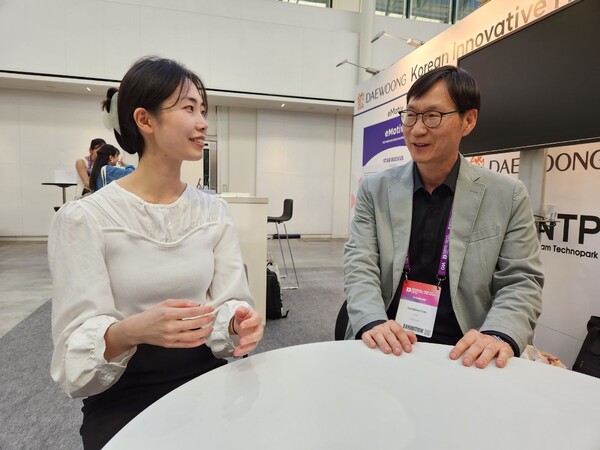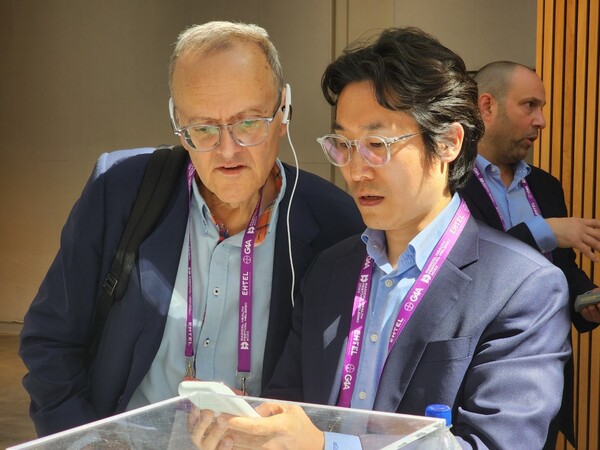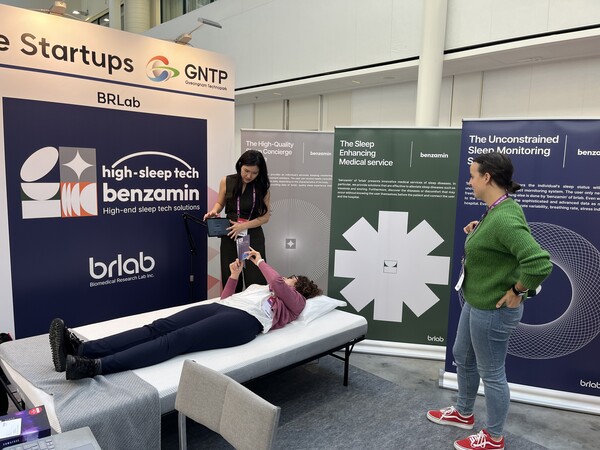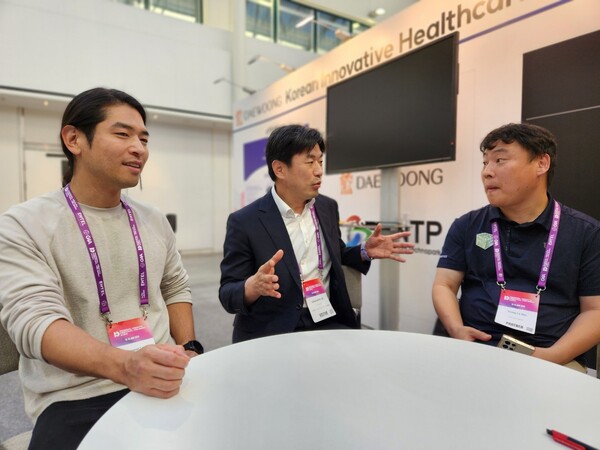HELSINKI -- By Marianne Chang/Korea Biomedical Review correspondent – Under Daewoong Pharmaceutical’s C&D Innovation Team and cooperation with Business Finland, six Korean digital health companies visited Helsinki to showcase their latest innovations.
Daewoong Pharmaceutical was invited to the first Radical Health Festival Helsinki by Dr. Päivi Sillanaukee, Special Envoy for Health and Wellbeing at the Ministry of Social Affairs and Health.
“While Korea still stands in the early stages for DTx, some countries in the European Union already have lots of experience and real-world data for DTx use,” said Yang Sung-eun, Daewoong Pharmaceutical’s head of C&D Innovation, explaining the reason for coming to Finland.
On the sidelines of the Radical Health Festival Helsinki event, Korea Biomedical Review interviewed executives from eMotiv, BRLAB, Huniverse, Medi-IOT, B.I.G.S Spring Tree, and Neurive.

Jeong Min-young, Head of R&D at eMotiv, disclosed that the Finnish Ministry of Social Affairs and Welfare suggested three potential local game companies for collaboration. Additionally, a local medical consortium expressed interest in exploring future opportunities for supporting clinical trials and research.
Positive reactions to Korean digital health solutions
eMotiv showcased the healthcare edition of their digital therapeutics (DTx) device, Star Ruckus, which is currently in need of clinical trials. Designed to address attention deficit hyperactivity disorder (ADHD) in children aged 6 to 12 years, this DTx device can be conveniently downloaded from the Korean Android/iOS market without a prescription. In just 30 minutes, it allows for the assessment of cognitive abilities, including ADHD. Moreover, with consistent daily usage of approximately 25 minutes, it offers cognitive enhancement for children.
Similarly, Neurive is developing electroceuticals and digital therapeutics devices that utilize neuromodulation techniques, such as electrical stimulation and neurofeedback, for the treatment of degenerative brain diseases.
“Many expressed satisfaction after trying the device and we also gathered information from potential investors,” said Neurive CTO Choi Hyuk.

BRLAB, a Korean start-up specializing in sleep technology, displayed its solutions for monitoring bio-signals and sleep status, improving sleep through bio-feedback, and providing coaching through data-based AI.
“As Finland has advanced digital healthcare technologies, especially in the field of sleep, we are seeking a clinical test partner in Finland for attaining European certification and a distribution partner,” said BRLAB CEO Lee Jong-min. “We found that there was a lot of interest in our technology, and we met a lot of great partners that we hope to collaborate with in the future.”

Also, B.I.G.S Spring Tree CEO Seo Jeong-ho introduced the metaverse virtual reality training system which targets the education of doctors and nurses in hospitals and schools.
“We focused on demonstrating the potential of metaverse virtual reality simulation rather than the educational material as visitors were most interested in that aspect,” said Seo.
Medi-IOT also presented its low-level light therapy (LLT) technology which applies a photobiomodulation mechanism for treating dry eye disease and macular degeneration. The device should be worn for two minutes a day, twice a week, for one month.
“I think we were able to convince visitors from local Finnish hospitals that our self-treatment device for dry eye and macular degeneration due to aging is well suited to their needs,” said Medi-IOT Lee Sang-keun.
Huniverse’s cloud-based medical platform, Precision Medical Hospital Information System (P-HIS) was also on display. It is the first in Korea which offers large hospitals a cloud-based hospital information system that they can utilize on-site.
“Based on global standards through Cloud HIS, we aspire to use the medical big data we gather to provide patient-specific precision medical services,” said Huniverse CEO Lee Sang-heon. “Through Findata, Finland is already gathering data about the overall economic, insurance, and medical problems of the nation and we wish to collaborate with them to lead the precision medical sector.”
Penetration strategies for the Finnish and EU market
Regarding penetration strategies, eMotive said the DTx version will initiate clinical trials with Seoul National University Hospital (SNUH) in September 2023. In the meantime, the healthcare version is scheduled to be released on the Finnish Android/iOS market in the fourth quarter of this year.
“Children's cognitive abilities, including ADHD, are closely related to academic achievement so we hope to partner with suitable educational institutions, MedTech companies, and other digital health companies with the same target customer to penetrate the Finnish market,” said Jeong.
Subsequently, they will target the North American market in the second half of this year and the Vietnamese market in the first half of next year, she went on to say. In parallel, they also plan to launch a service targeting autism spectrum disorder (ASD) for children later this year.
Following a similar strategy to eMotiv, Medi-IOT plans to enter the market first as a wellness product in the first half of 2024, and subsequently start exploratory clinical trials in 2026.
“As Finland ranks highly among countries with an increasing number of geriatric patients, we would like to collaborate on business development related to eye diseases, and clinical and device certification,” explained Lee.
The company plans to first prepare for entry into the Korean market and will strive for Series A investment through prototype launch to conduct exploratory clinical trials.
Meanwhile, BRLAB said that it plans to officially transition from its lab to an official company brand in the latter half of this year, and will continue seeking medical device certification for its devices.
Huniverse also plans to differentiate its cloud service by offering customizable modules that fit the size of the hospital and the hospital's specialized services.
“As Finland is undergoing healthcare reform in their EMR system, we would like to provide our PHIS which offers data compatibility and standardized clinical terminology to healthcare institutes or IT companies in Finland," said the CEO.

B.I.G.S Spring Tree also outlined cooperation with local organizations, patent registration, and adapting simulation and training systems to the Finnish medical field as the next steps for the company.
Due to the stricter guidelines under Europe’s newest Medical Device Regulation (MDR), both MDR and UKCA certifications are now mandatory for commercialization in Europe and the U.K.
Accordingly, Neurive plans to conduct clinical trials for its products involving treatments for tinnitus, insomnia, or mild depression in Finland to achieve the MDR certificate and in the to achieve the UKCA certificate.
Overcoming the regulatory challenges and more
Still, some challenges remain. As start-ups, they face stiff competition from more well-known competitors pursuing the same area of expertise. In this regard, eMotiv plans to differentiate its device by offering a wider array of treatments from early screening to actual treatment to compete with the likes of Cognifit and Akili.
Neurive also has competition from LivaNova, which has an FDA-approved device for treating intractable depression and epilepsy but it is invasive and requires a generator to be transcutaneously inserted into the body which could lead to hardware malfunction, infection, and dysphagia.
He also mentioned a few non-invasive devices but noted that they don’t provide sound treatment control, are not easy to handle, and only stimulate one side of the vagus nerve which was all addressed in the device Neurive is developing.
As digital health companies, they stressed the importance of protecting users' personal information and building trust by focusing on collecting only essential information.
In this regard, Medi-IOT noted that it would minimize the exposure of personal information by allowing all data processing to be done on the device and storing and managing only the results excluding sensitive information on the server.
Huniverse also mentioned that it is building a systematic medical data platform and data information protection management system by acquiring various certifications that meet the requirements for compliance with personal information protection and security regulations, interoperability, and big data construction of domestic medical data.
Related articles
- How Nokia spurred Finland's burgeoning digital health ecosystem
- ‘Slow adoption of AI, DTx solutions prohibitive in medical field’
- Daewoong's digital healthcare start-ups to seek stronger ties at Helsinki event
- Korean start-ups get boost to enter Europe with MOU between IBK, KIST, German government
- KT, LGU+ jump into digital medical device biz to expand market
- Equity investments, M&A spur Korean DTx industry's steady growth
- Naver donates $23.7 mil to SNUH to help foster digital bio research
- Korean regulator publishes English DTx and AI-related clinical guidelines
- Number of DTx license applications since April remains ‘zero’
- Finland ready to foster new health collaborations with Korea on 50th anniversary

